2018 Mazda CX-9 Review: A Midsize Crossover for the Sport Sedan Set
When you want a sports sedan, but need a midsize crossover
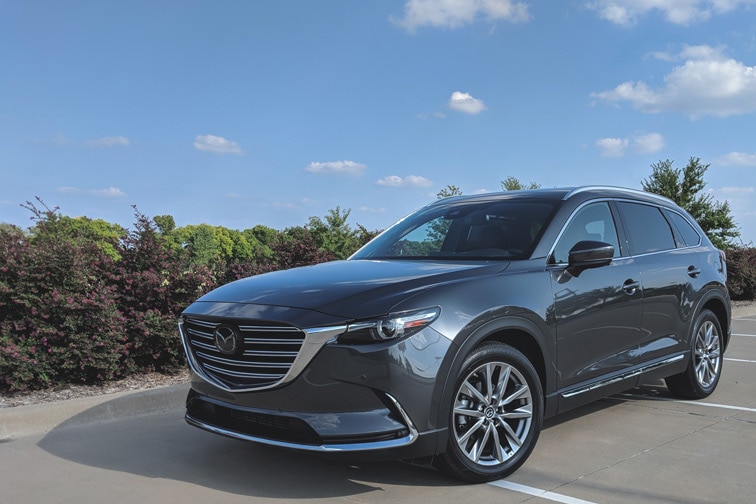 Aaron Miller/Capital One
Aaron Miller/Capital One
On paper, the Mazda CX-9 is a three-row crossover that ticks most of the boxes that responsible people look for. It seats seven, has more than enough cargo room for runs to the DIY store or Saturday morning sporting events, and offers no shortage of high-tech safety features. But that’s just paper.
Out in the real world, there’s an added layer of emotional depth to the CX-9. Mazda people like to say that, “Driving Matters.” They like to wax philosophically about things like Jinba-Ittai, an old Japanese saying that loosely translates to horse and rider are one. The CX-9’s heavy emphasis on design and driving dynamics clearly reflects Mazda’s overall ethos, and lends it a uniquely premium position in the crowded crossover marketplace between its affordable competition and upmarket-oriented luxury offerings.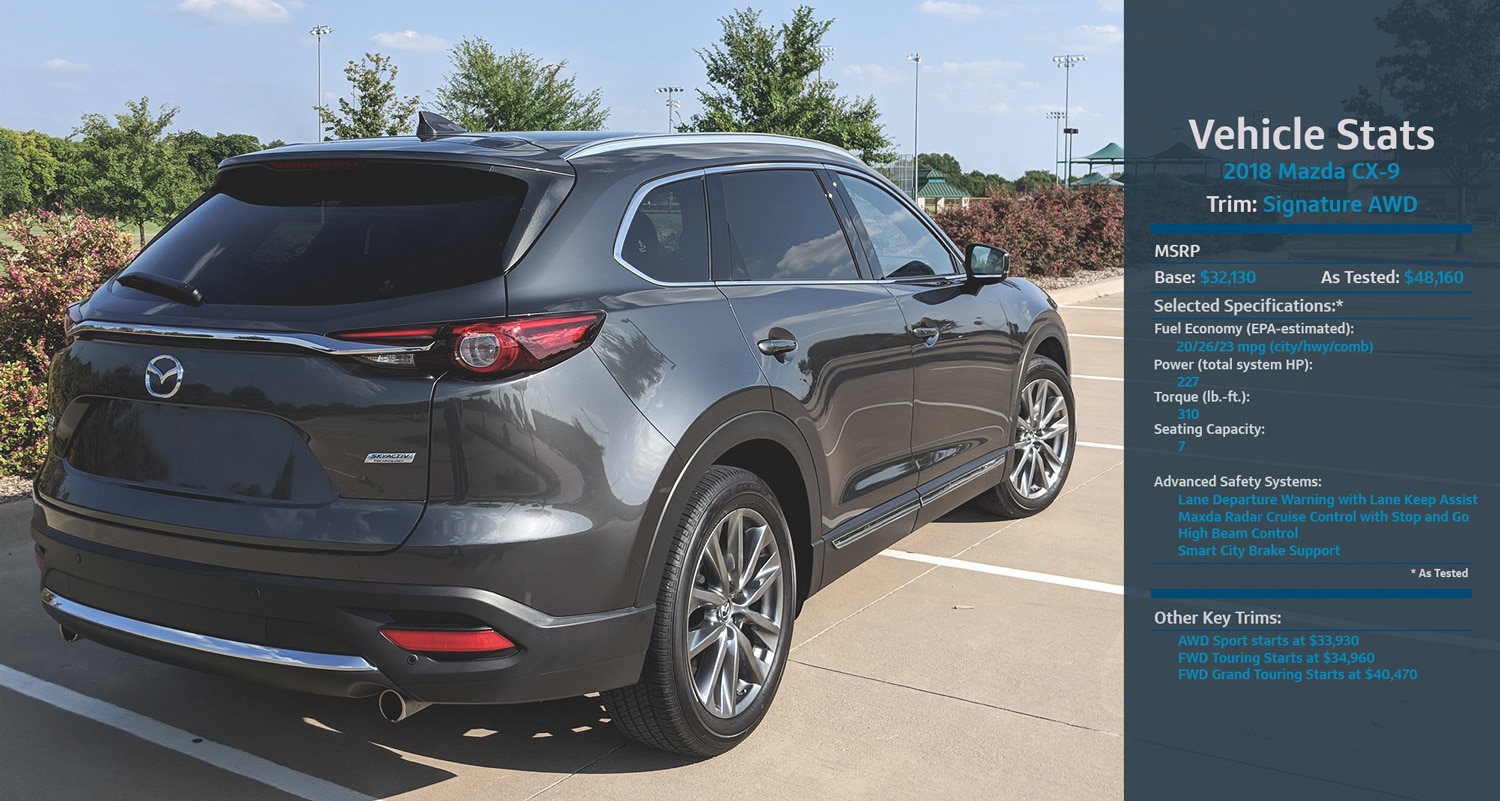 Aaron Miller/Capital One
Aaron Miller/Capital One
With a base MSRP starting at $32,130, the 2018 version of Mazda’s largest vehicle starts off slightly higher than some of its crossover counterparts, but it doesn’t climb quite as high, either. Case in point: the CX-9 that Mazda sent us to test for a week—in the top-of-the-line Signature AWD trim and fitted with a few optional goodies—topped out at MSRP $48,160, or over $1,300 less than the similarly equipped Toyota Highlander Hybrid we drove earlier this year.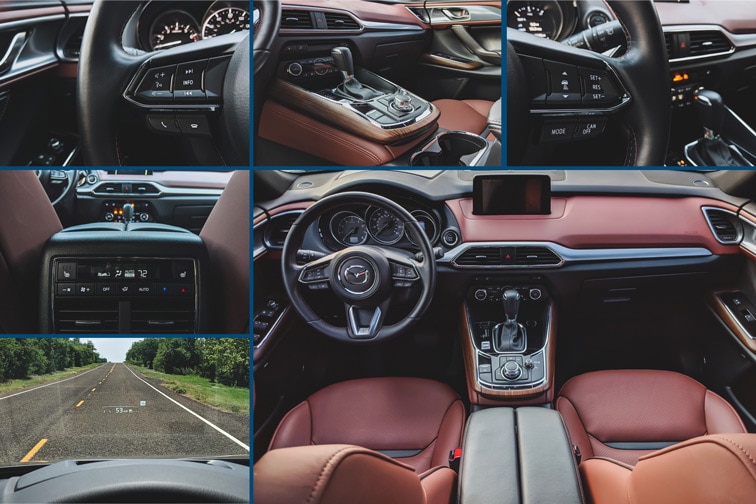 Aaron Miller/Capital One
Aaron Miller/Capital One
Sometimes, style is substance
Sleek is a word not commonly associated with three-row crossovers, but it applies to the CX-9’s sharp, angular front, long hood and downward-raked roofline. The pronounced uptick at the rear of the third-row side windows—familiar to German sport sedan enthusiasts as aInside, the Mazda stays true to the notion that the driver should take center-stage. Engage the rotary-style infotainment interface, and the audio system comes to life with sound clarity that’s a pleasant surprise at this price point. The three-spoke steering wheel would feel equally at home in a Miata, the sport seats hug you in place and, on the 55 percent of all CX-9s that come in Grand Touring or Signature trim, a modern mix of materials that includes leather, metal and wood lends a decidedly up-market feel. For those yearning for modern technologies, those higher trim levels also offer a head-up display, heated steering wheel and adaptive LED headlights, which greatly enhance nighttime vision by angling toward the direction at which you point that three-spoke steering wheel.
You may also like:
How to Snag the Best Leftover Cars
Commuter Car Review: 2018 Honda Accord Hybrid
Leasing vs. Buying a Car: A Flow Chart
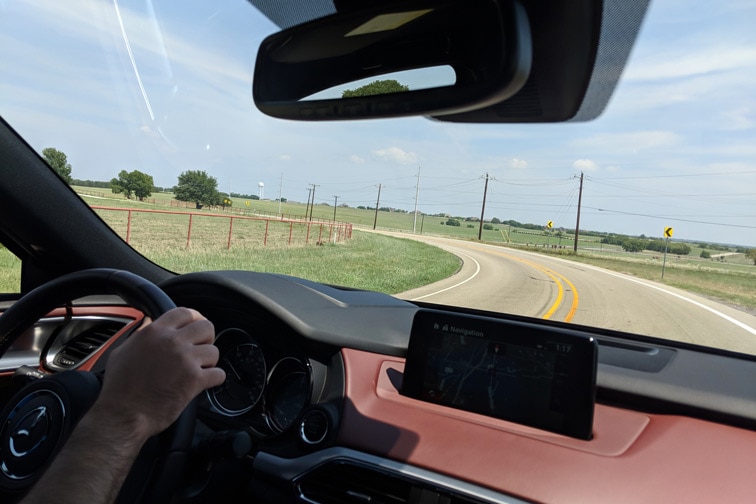 Aaron Miller/Capital One
Aaron Miller/Capital OneOn the road, it drives like a Mazda
It would be easy to write that off as mere marketing speak, but out on the road, the CX-9 offers something that not many three-row crossovers—and especially at this price point—can replicate: It’s truly engaging to drive. Steering is more precise and direct than a practical family vehicle has any right to be. It’s no MX-5 Miata, of course, but it can turn the journey from A to B into an enjoyable event in and of itself.The ride is smooth, but never to the point of disconnecting the driver from the road. Bumps and dips are dealt with in a refined manner that communicates what you’ve driven over without jarring occupants or bouncing excessively. Especially compared to other midsize crossovers, secondary motion is kept to a minimum, meaning it always conveys a sense of control, ready for the next set of commands from the driver.
The engine produces 250 hp, but it’s the 310 lb.-ft. of torque that helps the 4,361-lb. crossover feel more like its diminutive Miata cousin when accelerating away from a traffic light, and inspires confidence when merging onto a crowded freeway.
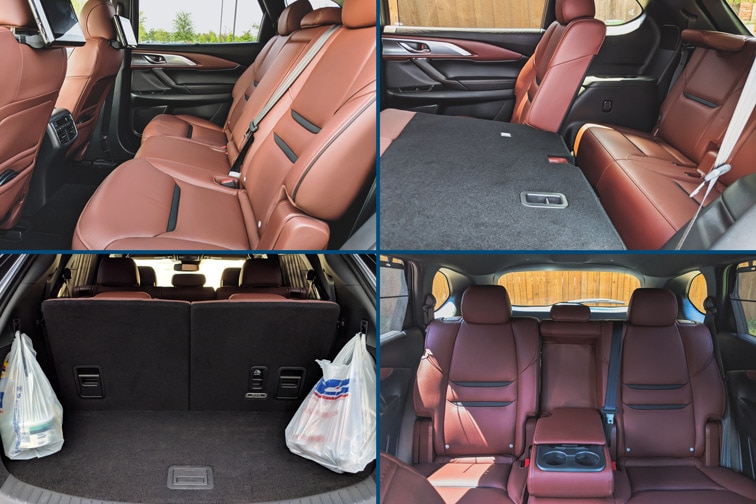 Aaron Miller/Capital One
Aaron Miller/Capital OneIt’s practically practical, too
The third-row seating area is, almost literally, the CX-9’s most notable shortcoming. Maneuvering around the second-row seats requires a degree of flexibility, and once nestled in the third row, a scarcity of legroom—listed at 29.7 inches, but significantly less in practice—makes it akin to a third-row paper tiger.While not a major gripe, the power moonroof doesn’t open very far, leaving just a narrow hole in the roof when opened. The rear seat entertainment system feels more like an optional add-on rather than an integrated setup. Aesthetics aside, it means the screens on the back of the front seat feel somewhat close to rear occupants, and when folding the second row seats down, the headrests can make contact.
Other than those slight knocks, the CX-9 delivers on its promise of practicality. Cargo area—38.2 cubic feet with the third-row folded down—is competitive within its class, and aside from the third row, everything is straightforward.
Driving Matters, but so does safety
Starting with the 2018 model year, Mazda’s Smart City Brake Support joins a Blind Spot Monitor and Rear Cross-Traffic Alert as standard equipment on all CX-9s. Spring for the Touring trim, and a full suite of advanced driving aids that includes automatic high beams, Lane Keep Assist, Lane Departure Warning and adaptive cruise control is included.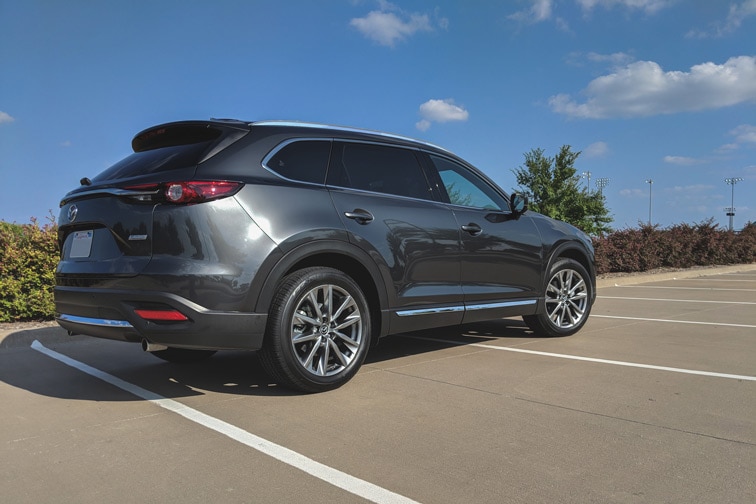 Aaron Miller/Capital One
Aaron Miller/Capital OneConclusion: CX-9 blurs the lines between sport, utility and luxury
From the aforementioned steering wheel to gauges that look as though they were lifted directly from Porsche’s latest and greatest, CX-9 doesn’t lack for style. It’s dimensionally similar to segment stalwarts like the Toyota Highlander and Honda Pilot—and priced similarly, too. And yet it drives more like you’d expect from significantly higher-priced offerings out of BMW, Mercedes or Audi.
The Mazda CX-9 carves its own unique spot in the market. If you need a three-row crossover, but don’t need to use that third row on a daily basis, and if you want a vehicle that tells the world that you care about what you drive, it’s worth a closer look.
Written by humans.
Edited by humans.
 Aaron Miller
Aaron MillerAs a veteran automotive journalist, I have been fortunate enough to drive some of the most desirable cars on the planet and get to know some of the most important people in the industry. Before joining Capital One, I served as the Cars Editor for a major national website, and covered industry news and analysis for well-known automotive-specific sites. I also wrote feature articles and reviews for niche enthusiast websites. I’ve been obsessed with cars since—literally—before I can remember, with my collection of die-cast and slot cars taking center stage during my formative years. Simply put, for me, working isn’t really “work.”
Related articles
View more related articles